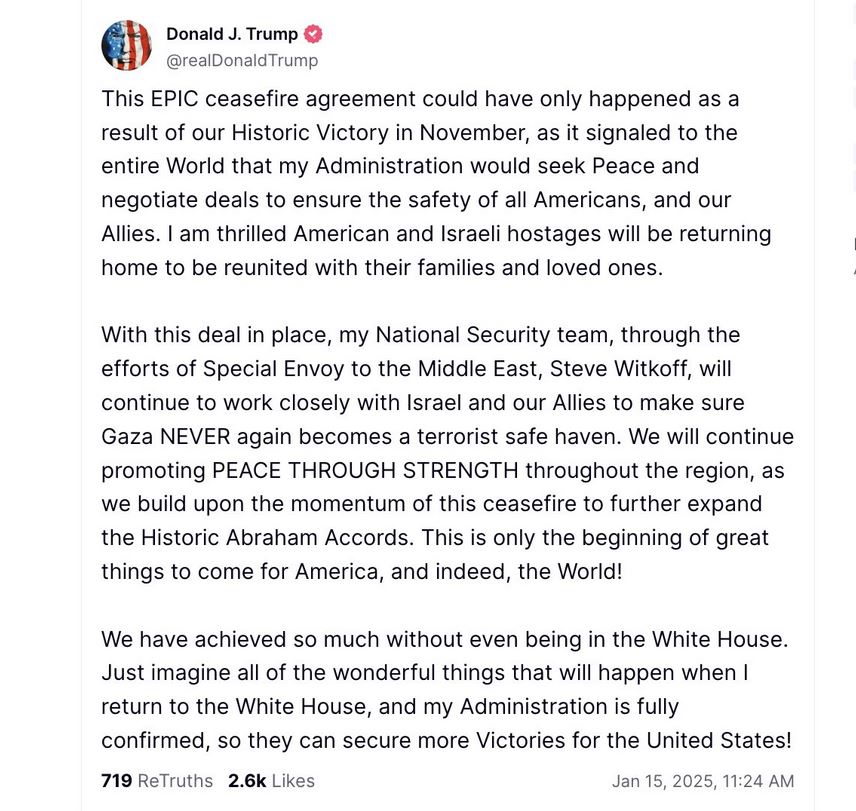
In a pivotal development aimed at ending over 15 months of devastating conflict, Israel and Hamas have reached a phased agreement to bring an end to the war in Gaza.
The deal, which could lead to a ceasefire as early as January 19, 2024, includes provisions for a gradual withdrawal of Israeli forces, the release of hostages taken by Hamas, and the freeing of Palestinian prisoners held by Israel.
Negotiations, which were finalized on Wednesday, have been ongoing for months and involved key mediators, including officials from Egypt, Qatar, and the United States.
Following the announcement, US President Joe Biden confirmed the deal, marking a significant step toward peace after months of violence that has left tens of thousands of Palestinians dead and displaced millions.
Today, after many months of intensive diplomacy by the United States, along with Egypt and Qatar, Israel and Hamas have reached a ceasefire and hostage deal.
My diplomacy never ceased in their efforts to get this done – I will speak more about this soon.
1.5K
Reply
Copy link
Israel-Hamas ceasefire deal
The agreement, which has not yet been officially announced, will initiate a six-week ceasefire period, with Israeli forces beginning to pull back from Gaza.
As part of the deal, Israel will release Palestinian prisoners in exchange for hostages taken by Hamas, bringing hope to families on both sides who have been enduring the horrors of the war.
Affected communities in Gaza celebrated the news, despite the continued Israeli airstrikes in the region.
The deal’s first phase will see the release of 33 Israeli hostages, including all women, children, and men over 50.
A second phase is expected to commence by the 16th day of the ceasefire, which will include the release of all remaining hostages and a permanent ceasefire agreement.
The final phase will focus on returning the bodies of deceased individuals and rebuilding Gaza, with international bodies such as the United Nations overseeing the reconstruction efforts.
Qatari mediators, who played a crucial role in facilitating the agreement, expressed hope that the ceasefire would foster stability not only in Gaza but across the wider Middle East.
In the streets of Tel Aviv, families of Israeli hostages expressed both relief and optimism.
While the ceasefire has been hailed as a major step forward, political challenges remain.
One of the key sticking points is who will govern Gaza post-war.
Israel has ruled out any involvement by Hamas, while also opposing any role for the Palestinian Authority.
These complex political dynamics, along with the enormous task of rebuilding Gaza, will require cooperation between Israel, the Palestinians, Arab states, and international organizations.
The deal is set against a backdrop of political pressure, with US President-elect Donald Trump signaling that he would use the ceasefire as a foundation to expand the Abraham Accords — agreements that normalized Israel’s relations with several Arab countries during his first presidency.

Trump has repeatedly called for a swift end to the conflict and has been instrumental in pushing the negotiations forward.
The ceasefire deal’s potential to de-escalate tensions in Gaza could provide relief not only to the Palestinian and Israeli populations but also to the broader Middle East, where the conflict has already sparked unrest in Lebanon, Syria, Yemen, and Iraq.
Additionally, tensions between Israel and Iran have escalated as a result of the war, with concerns of further regional conflict.
As the situation continues to unfold, international leaders are hopeful that this ceasefire marks the beginning of a lasting peace.
Belgian Prime Minister Alexander de Croo expressed his relief, stating, “After too many months of conflict, we feel tremendous relief for the hostages, for their families, and for the people of Gaza. Let’s hope this ceasefire will put an end to the fighting and mark the beginning of a sustained peace.”
However, the road ahead remains complex, with many unresolved issues surrounding Gaza’s future and the ongoing humanitarian crisis in the region.
The successful implementation of this ceasefire, alongside efforts to provide aid and rebuild Gaza, will require sustained international cooperation.
The post Israel and Hamas reach historic ceasefire deal to end Gaza war and free hostages appeared first on Invezz


